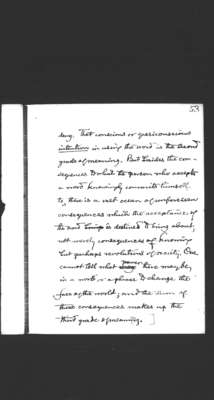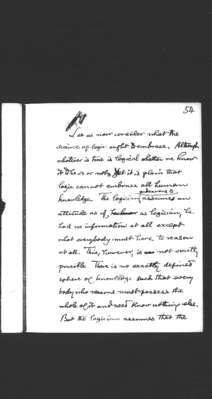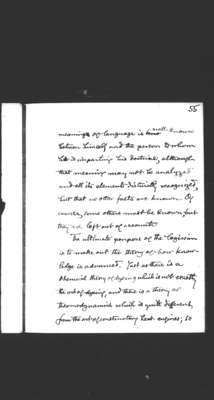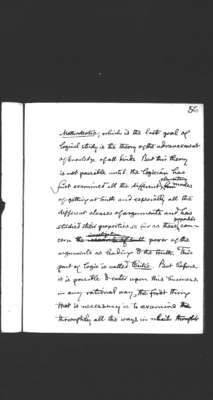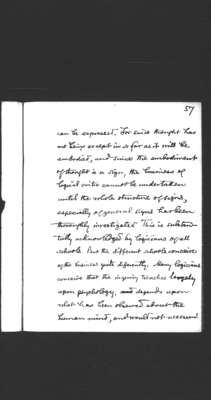Pages
81
53
deny. That conscious or quasiconscious intention in using the word is the second grade of meaning. But besides the consequences to which the person who accepts or word knowingly commits himself to, there is a vast ocean of unforeseen consequences which the acceptance of the word is destined to brin about, not merely consequences of knowing but perhaps revolutions of society. One cannot tell what power there may be, in a word or a phrase to change the face of the world; and the sum of these consequences makes up the third grade of meaning.
82
54
Let us now consider what the science of logic ought to embrace. Although whatever is true is logical whether we know it to be so or not. Yet it is plain that logic cannot embrace all human knowledge. The logician endeavors to assume an attitude as if, as logician, he had no information at all except what everybody must have to reason at all. This, however, is not exactly possible. There is no exactly defined sphere of knowledge such that every body who reasons must possess the whole of it and need know nothing else. But the logician assumes that the
83
55
meaning of language is well-known between himself and the person to whom his is imparting his doctrin, although that meaning may not be anlayzed and all its elements distinctly recognized, but that no other facts are known. Of course, some others must be known; but they are left out of account.
The ultimate purpose of the logician is to make out the theory of how knowledge is advanced. Just as there is a chemical theory of dyeing which is not exactly the act of syeing, and there is a theory of thermodynamics which is quite different from the art of constructory heat-equiries, so
84
56
Methodentic, which is the last goal of logical study is the theory of the advancement of knowledge of all kinds. But this theory is not possible until the logician has first examined all the diferent elementary modes of getting at truth and expecially all the different classes of arguments and has studied their properties so far as these properties concern piwer of the arguments as leading to the truth. This part of logic is called Critic. But before it is possible to enter upon this business in any rational way, the first thing that is necessary is to examine throughly all the ways in which thought
85
57
can be expressed. For since thought has no being exceot in so far as it will beembodied, and since the embodiment of thought is a sign, the business of logical critic cannot be undertaken until the whole structure of signs, especially of general signs harkeen throughly investigated. This is substantailly acknowledged by logicians of all schools. But the different schools conceive of the business quite differently. Many logicians conceive that the inquiry trenches largely upon psychology, depends upon what has been observed about the human mind, and would not necessared
